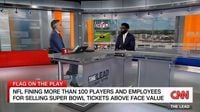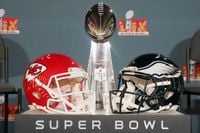The NFL is facing a major scandal as more than 100 players and nearly two dozen club employees have been fined for reselling their Super Bowl 59 tickets above face value. This revelation has sent shockwaves through the league and its fanbase, exposing a resale hustle that contradicts the NFL's commitment to fairness and fan loyalty.
According to an investigation detailed by the Associated Press's Rob Maaddi, the league uncovered that numerous players and staff violated longstanding league policies by flipping their Super Bowl tickets for profit. Players caught in the act face fines amounting to one and a half times the ticket's face value, while employees are hit with penalties double the ticket price. But the consequences don’t stop there: those involved will be barred from purchasing Super Bowl tickets for the next two years unless they are actively playing in the game.
All NFL players are entitled to buy two Super Bowl tickets at face value. However, the league’s collective bargaining agreement explicitly prohibits selling these tickets for more than their original price. Despite this, many players and employees sold their tickets to third-party brokers, known as "bundlers," who then resold them at exorbitant prices. This practice not only violates league rules but also undermines the experience for genuine fans, many of whom are already priced out of attending such a marquee event.
Sabrina Perel, the NFL's head of compliance, issued a memo to all teams highlighting the severity of the situation. She stated, "Our initial investigation has determined that a number of NFL players and coaches, employed by several NFL Clubs, sold Super Bowl tickets for more than the ticket’s face value in violation of the Policy." She emphasized that this policy is a longstanding part of the league’s collective bargaining agreement, forbidding any league or club employees from profiting personally at the expense of fans.
Perel further explained that the investigation revealed that club employees and players sold their tickets to a small group of bundlers collaborating with ticket resellers to inflate prices. The league is currently completing its inquiry, and the penalties for future violations will only become harsher. "In advance of Super Bowl LX, we will be enhancing the mandatory compliance training regarding the Policy for all League personnel," Perel said. "We will also increase the penalties for future violations of this Policy. All clubs must ensure their personnel understand and comply with this policy." Additional compliance measures and details are expected to be announced in early fall 2025.
This scandal, already dubbed "Ticketgate" by fans and commentators online, marks one of the NFL's most unusual offseason controversies. Unlike past scandals involving player conduct, performance-enhancing drugs, or cheating, this issue centers on the integrity of ticket distribution and respect for the fanbase. The league’s firm stance sends a clear message: abusing the privilege of Super Bowl ticket access will result in serious consequences.
The fines and suspensions are significant, but the reputational damage may be even greater. Super Bowl tickets are among the most coveted perks in professional sports, and the fact that over 100 players and staff risked losing access to them for personal gain is striking. Fans have expressed disappointment and frustration, seeing this as a betrayal of trust from the very people they support.
While no individuals implicated have been publicly named, the NFL’s ongoing internal investigation suggests that more fines or bans could be forthcoming. The league’s commitment to transparency and enforcement aims to restore confidence among fans and uphold the spirit of fair play.
As the NFL prepares for Super Bowl LX in February 2026, these enhanced compliance efforts and stricter penalties underscore the league’s determination to prevent a repeat of this scandal. The message is clear: the NFL will not tolerate profiteering from its affiliation, especially when it comes at the expense of its loyal fanbase.
With the investigation still underway, the fallout from "Ticketgate" is likely to shape league policies and player conduct training for years to come. The NFL’s approach to this incident highlights the delicate balance between privilege and responsibility that comes with being part of one of the world's most popular sports leagues.
Ultimately, this episode serves as a potent reminder that the Super Bowl is not just a game for the players but a cherished event for millions of fans worldwide. Protecting the integrity of ticket distribution is crucial to preserving the magic and accessibility of this iconic sporting spectacle.


